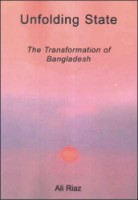|
Books
Bengal the Beautiful
 Bengal the Beautiful Bengal the Beautiful
Jibanananda Das
Joe Winter (translator)
Anvil Press Poetry, Limited; August 2006
This is the first English translation of a collection of 62 sonnets discovered in an exercise-book twenty years after Das' untimely death in a tramcar accident. These sonnets are imbued with a deeply tragic sensibility, "the touch of tears in mortal things", and with a scent of unrequited love. Written, according to the poet's brother, "under the influence of a certain emotion", these sonnets achieved instant popularity when first published, becoming a totemic symbol of freedom in Bangladesh's 1971 War of Independence. Das captured the country's heart and soul in these exquisite evocations of village life and natural beauty.
Unfolding State: The Transformation of Bangladesh
Ali Riaz
de Sitter Publications; June 2005
 Combining theoretical analysis with a macro-level case study of state transformation of Bangladesh since independence, Riaz (politics and government, Illinois State U.) argues that state transformation occurs when political and economic crises undermine the fundamental undertaking of the state and when there is an emergence of a counter class coalition to replace the ruling regime. In the case of Bangladesh, he argues that the economic and political marginalisation of ethnic Bengalis in the Pakistani state allowed intermediate classes (junior officials, professionals, and intelligentsia) to construct a successful counter-hegemonic ideology and thus to gain political power. The subsequent capturing of control over this ruling bloc by executives succeeded in marginalising this political regime by the mid-1970s, a trend accompanied by a growing authoritarianism. Unfortunately, the end of military rule in 1990 does not promise a return to the secular, democratic, and social roots of the original Bangladeshi ideology because of the incorporation of Bangladesh into the global system and the creation of a rich political patron class quite satisfied with the current state of affairs. Combining theoretical analysis with a macro-level case study of state transformation of Bangladesh since independence, Riaz (politics and government, Illinois State U.) argues that state transformation occurs when political and economic crises undermine the fundamental undertaking of the state and when there is an emergence of a counter class coalition to replace the ruling regime. In the case of Bangladesh, he argues that the economic and political marginalisation of ethnic Bengalis in the Pakistani state allowed intermediate classes (junior officials, professionals, and intelligentsia) to construct a successful counter-hegemonic ideology and thus to gain political power. The subsequent capturing of control over this ruling bloc by executives succeeded in marginalising this political regime by the mid-1970s, a trend accompanied by a growing authoritarianism. Unfortunately, the end of military rule in 1990 does not promise a return to the secular, democratic, and social roots of the original Bangladeshi ideology because of the incorporation of Bangladesh into the global system and the creation of a rich political patron class quite satisfied with the current state of affairs.
The Prince of a Dream: The Story of the Grameen Bank
David Bornstein
Oxford University Press; November 2005
 This book is the compelling story of the Grameen Bank, one of the most successful development organisations in the world. Founded by Muhammad Yunus in Bangladesh in 1976, the Grameen Bank has extended small loans for self-employment to more than two million women villagers and has helped lift hundreds of thousands out of poverty. The Grameen Bank's "trickle up" approach has inspired the creation of hundreds of "micro-credit" programmes around the world and helped to reshape international development policy. This book is the compelling story of the Grameen Bank, one of the most successful development organisations in the world. Founded by Muhammad Yunus in Bangladesh in 1976, the Grameen Bank has extended small loans for self-employment to more than two million women villagers and has helped lift hundreds of thousands out of poverty. The Grameen Bank's "trickle up" approach has inspired the creation of hundreds of "micro-credit" programmes around the world and helped to reshape international development policy.
Compiled by Sanyat Sattar
Copyright (R) thedailystar.net 2006 |
| |
